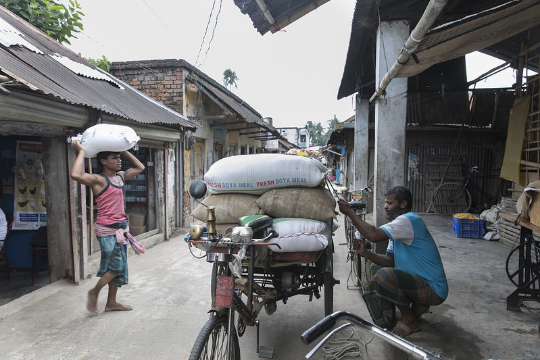COVID-19 and Agricultural Sustainability
Nazia Azrumir Prima | 04 February 2021
The COVID-19 pandemic has shown us how the world is becoming powerless against the infection, with the absence of preparation and lack of human capacity to envision, adapt and adjust. The pandemic will have both short and long-term impacts on our economy and agricultural sector. The effects on the agricultural industry are of particular importance to us since the livelihoods of a large number of people in Bangladesh depend on agriculture.
The initial lockdowns in Bangladesh have caused severe food shortages. Since most farmers have been unable to adapt to mechanised agriculture, and the industry is also facing a labour shortage, their production has fallen into risk in terms of harvesting. Due to a lack of buyers and unavailability of supply channels, products have to be sold at low prices. The lockdown severely restricts the farming community's mobility, primarily affecting farm labourers who must generally move from one place to another to work and earn money. The farmers in the haor area are suffering from a shortage of labour and the challenges of the upcoming rainy season. Lockdowns and related communication difficulties have impeded marketing of high-value commodities such as fruits, vegetables, poultry and dairy products etc. Imports have been stopped because of the lockdown, which has led to an abnormal rise in onion prices. Farmers involved with crab, shrimp, and fish production are facing export bans, resulting in significant economic losses. The landless and small–scale farmers are suffering the most in this situation. They are facing financial problems, lack of proper seed and fertiliser distribution, less availability of transportation system, unbalanced market price, lack of storage facilities, traditional way of cultivation etc. In some cases, farmers help each other by providing fertiliser support, exchanging seeds and basic food supply, in addition to the cash provisions offered to the farming community in times of crisis. Population increase, flooding, and excessive rainfall resulting in weather change have dramatically impacted agricultural conditions.
The government has taken some policy measures to maintain sufficient food supply, protect the agricultural sector and mitigate possible losses. The growth rate in rice production is positive during the pandemic. As the pandemic unfolds, Bangladesh's Ministry of Agriculture and Department of Fisheries and Horticulture have found a way to hold and co-ordinate endeavours to guarantee ideal accessibility to inputs, extension support, and transportation.
Still, agriculture is the most crucial part of our economy, contributing 19.6 percent to the National GDP and providing employment for 63 percent of the population. According to the November 2020 report of USDA, the total production of rice is 35.6 million and 50 thousand tonnes. In January, the latest data shows that the Department of Agriculture Extension had set an objective of creating around 3.7 million tonnes of potatoes on 160,000 hectares of land in Rajshahi division during the flow Rabi season. The target has been exceeded by 2.63 percent. Livestock and Fisheries together contribute 3.3 percent of the GDP and 10.33 percent of the agriculture sector and provide daily dietary protein and milk necessities of individuals.
The United Nations (UN) reports that the pandemic will have short and long-term impacts across the sustainable development goals (SDGs) and unsettle the SDG targets. To overcome this state, we should introduce a subsidy-based transportation system for agriculture to enliven the supply chain. Direct selling in the market consumers via Trade Corporation may reduce the chance of food wastage and shortage. The skills, knowledge, awareness and planning capacity of farmers should be increased. Many have lost their jobs during this pandemic, and in their spare time, they have grown crops in surrounding lands. Rooftop cultivation is presently a well-known medium to meet a portion of our daily food needs, so it should have more emphasis. The government should also focus on inclusive and integrated agricultural risk management approaches.
Nazia Azrumir Prima, Research Intern, CGS.
Views in this article are author’s own and do not necessarily reflect CGS policy.
